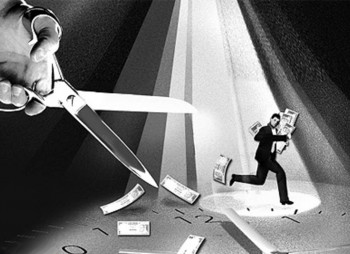Many media, InVenture included, have already written about replacing the income tax with exit capital tax. Supporters and opponents of such a step have long been arguing about the possible benefits and losses, and the Parliament has finally registered the draft bill, according to which the tax should be introduced since January 1, 2019. There is no chance of timely passing of the bill, but the issue remains relevant. The Discussion club of Delovaya Stolitsa publishing had experts go over it once again.
ECT introduction will facilitate the inflow of investments, suggests the Director of economic programs of the Ukrainian Institute of the Future Anatoliy Amelin. Since the income tax is being cancelled, there is an incentive to reinvest this profit in business development. It will become a foundation for the economic growth and, consequently, revenues to the state budget. Significant employment will be generated, the operating capital of companies and the volume of trade operations will grow. A number of experts pointed out that replacing one tax with another could lead to a reduction in budget revenues in the short term, and Anatoliy Amelin did not deny such a risk, but, in his opinion, this reduction will be non-critical – about 30 billion UAH in the first year – and it will be paid off by the positive effects. In addition, the growth of trade turnover will cause an increase in VAT revenues. According to Anatoliy Amelin, the total effect of the new tax will result in an additional two percent of GDP per year.
Financial analyst Alexei Kushch believes that the new tax is likely to discourage the desire to invest in the Ukrainian economy, at least for foreign investors. In contrast to Estonia, where ECT introduction resulted in an increase in investment, the Ukrainian economy has a more complex industrial structure, and as a result it needs to encourage outward investments rather than accumulate domestic ones. External investors are not interested in the country where they will not be able to receive profits and dividends. Therefore, the introduction of ECT will encapsulate business processes in Ukraine, says Alexei Kushch.
The analyst believes that Estonia does not owe its economic success to the new tax, which, moreover, is not introduced in its neighboring and even more prosperous countries. In addition, he complained that supporters of the new tax want to turn Ukraine into a "guinea pig". Such concerns are justified - before the ECT was introduced only in small countries, and Ukraine will become (or rather, may become) the first relatively large country with a developed heavy industry where such fiscal reform is carried out. What course will it take, what problems will emerge on the way - it all can be fully understood only upon carrying it out.
From the point of view of the Deputy Head of the Ukrainian National Agrarian Council Mikhail Sokolov, there is nothing wrong with conducting fiscal experiments in the country - as long as it still has no objective advantages over other countries and tax jurisdictions. Ukraine has high country risks, an unfavorable institutional environment for business, and corruption is the main "scarecrow" for foreign investors. In such circumstances, replacing the income tax with ECT may be one of the few advantages of the country.
He reminded that it would mean a radical simplification of transactions and controlled operations, and it would make it much easier to do business. The same was said by other debaters. Anatoliy Amelin noted that although the income tax provides only 9-9.5% of budget revenues, according to some studies, the accounting departments of enterprises spend almost half of their time on accounting of income and expenses and the compilation of statistics in tax audits. Thus, the income tax provides relatively small revenues to the budget, but heavily loads the fiscal authorities, which, in turn, stimulates corruption. ECT, on the other hand, significantly relieves this burden and in the long term allows to reduce the number of specialists engaged in business administration.
The head of the tax policy committees of public councils under the Ministry of Finance and SFS of Ukraine Tatyana Shevtsova said that according to the calculations of the Ministry of Economic Development and Trade it is impossible to conclude that the introduction of the new tax will lead to an inflow of investments. It is the simplification of administration, not the inflow of investment, that is the main purpose of this tax. At least, it can be said in the case of Estonia. As a result, currently the administration of 100 Euros of taxes in this country costs 34 cents, said Tatiana Shevtsova.
But such reforms will succeed only in the case of the overall development of the institutional environment in the country, Alexey Kushch objected. The advantages of Estonia are that there is an effective legislation and a well-functioning judicial system, as well as a digital government. In contrast to the Estonian, the Ukrainian judicial system has become notorious for its corruption, and the Ukrainian public administration – for its inefficiency, he said.
It is impossible to immediately carry out the reforms that will change all this, and we cannot wait for it, Mikhail Sokolov believes. In his opinion, it is necessary to reform at least what is possible.
Deputy General Director for Cooperation with State Bodies of PJSC ArcelorMittal Kryvyi Rih Vladimir Tkachenko also supported the idea of introducing ECT and noted that this will contribute to the investments of his company.
Former Deputy Minister of Finance of Ukraine, Head of the Board of Directors of the audit firm Aksenova and Partners GGI Geneva Group International Elena Makeeva said that the cancellation of income tax would be a "gift" to large companies – 5% of the total number of companies in the country provide about 80% of budget revenues. Thus, the reform will give them the opportunity not to pay this tax and will make their stakeholders richer. In addition, after the introduction of the ECT, tax inspections will not stop. Replacing one tax with another will only mean changing the object of inspection. In addition, the verification of the financial result on the basis of income and expenditure data is being replaced by the verification of all business transactions, a more complex procedure. According to Elena Makeeva, the introduction of ECT can be beneficial only to enterprises operating in the "shadow".






